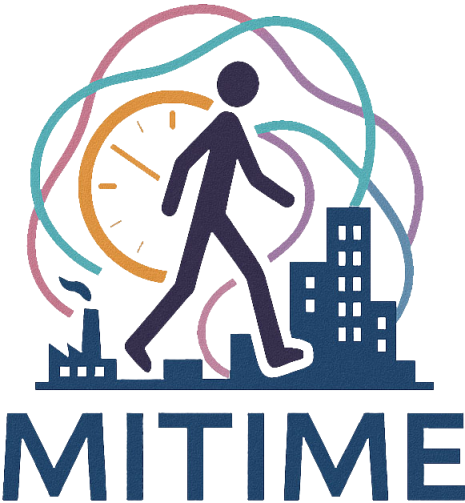ABOUT MITIME
MITIME is a Marie Skłodowska-Curie Doctoral Network focusing on how time shapes migration, inequality, and urban life in post-industrial Europe. We train early-stage researchers in cutting-edge theory, methods and transferable skills, and innovate approaches to understand human mobility as a multi-directional, contingent and relational process.
Understanding migration through time

Human migration remains one of the most pressing social, cultural, and political challenges of our time. Across Europe and beyond, the dynamics of migration are increasingly shaped by intricate temporal and spatial interrelations. While international organisations such as the United Nations and the European Union emphasise the importance of inclusion, sustainability, and resilience, the lived experiences of many migrants continue to be marked by uncertainty, precarity, waiting, and fluctuating mobilities.
In Europe’s post-industrial cities—urban environments transformed by economic restructuring, neoliberal austerity, and digitalisation—mobility takes diverse forms, ranging from forced displacement to highly privileged circulation. These conditions contribute to new forms of urban fragmentation and invisible segregation: subtle yet pervasive divisions among temporary, mobile, and precarious populations.
Despite a recent temporal turn in migration studies, the role of time—its governance, rhythms, ruptures, and inequalities—remains insufficiently understood, at the scale of both policy and research. Time profoundly structures migrants’ experiences, access to opportunities, and sense of belonging in a Europe marked by social stratification and accelerated change.
In Europe’s post-industrial cities—urban environments transformed by economic restructuring, neoliberal austerity, and digitalisation—mobility takes diverse forms, ranging from forced displacement to highly privileged circulation. These conditions contribute to new forms of urban fragmentation and invisible segregation: subtle yet pervasive divisions among temporary, mobile, and precarious populations.
Despite a recent temporal turn in migration studies, the role of time—its governance, rhythms, ruptures, and inequalities—remains insufficiently understood, at the scale of both policy and research. Time profoundly structures migrants’ experiences, access to opportunities, and sense of belonging in a Europe marked by social stratification and accelerated change.
Aims and vision

The Marie Skłodowska-Curie Doctoral Network MITIME: Entanglements of Migration and Time in Post-industrial Urban Europe has been established to explore how temporality shapes migration, inequality, and urban life in contemporary Europe.
The network aims to train a new generation of migration scholars, policy analysts, and practitioners who are equipped to critically examine and address the socio-cultural inequalities embedded in mobility and belonging. MITIME challenges conventional understandings of migration as a linear sequence—from departure to arrival to settlement—and instead approaches mobility as multi-directional, recursive, and contingent.
By integrating the analytical lens of temporality, MITIME contributes to advancing theoretical and methodological innovation in migration and urban studies. It seeks to deepen our understanding of how time intersects with governance, technology, and everyday life to shape migrants’ futures in post-industrial cities.
Through research, training, and public engagement, MITIME aims to generate evidence-based insights that inform policy, enhance social inclusion, and contribute to more equitable urban futures across Europe.
The network aims to train a new generation of migration scholars, policy analysts, and practitioners who are equipped to critically examine and address the socio-cultural inequalities embedded in mobility and belonging. MITIME challenges conventional understandings of migration as a linear sequence—from departure to arrival to settlement—and instead approaches mobility as multi-directional, recursive, and contingent.
By integrating the analytical lens of temporality, MITIME contributes to advancing theoretical and methodological innovation in migration and urban studies. It seeks to deepen our understanding of how time intersects with governance, technology, and everyday life to shape migrants’ futures in post-industrial cities.
Through research, training, and public engagement, MITIME aims to generate evidence-based insights that inform policy, enhance social inclusion, and contribute to more equitable urban futures across Europe.
Recruiting universities

University of Oulu, Finland (4 PhD positions)
Ruhr University Bochum, Germany (2 PhD positions)
University College Cork, Ireland (2 PhD positions)
University of Deusto, Spain (2 PhD positions)
Koç University, Türkiye (2 PhD positions)
University of Liège, Belgium (2 PhD positions)
Erasmus University Rotterdam, Netherlands (1 PhD position)
Ruhr University Bochum, Germany (2 PhD positions)
University College Cork, Ireland (2 PhD positions)
University of Deusto, Spain (2 PhD positions)
Koç University, Türkiye (2 PhD positions)
University of Liège, Belgium (2 PhD positions)
Erasmus University Rotterdam, Netherlands (1 PhD position)
MITIME's seven European university partners work at the forefront of migration studies. Each university will recruit, hire and train 1-4 doctoral researchers:
Non-academic partners

City of Oulu
Cork Migrant Center
Cripel Regional Center for the Integration of Foreigners
German Federal Employment Agency (North-Rhine Westphalia Regional Directorate)
Gernika Gogoratuz Peace Research Center
International Center for Migration Policy Development (ICMDP)
INTERSOS Hellas
Liège Theatre
UNESCO ETXEA
Cork Migrant Center
Cripel Regional Center for the Integration of Foreigners
German Federal Employment Agency (North-Rhine Westphalia Regional Directorate)
Gernika Gogoratuz Peace Research Center
International Center for Migration Policy Development (ICMDP)
INTERSOS Hellas
Liège Theatre
UNESCO ETXEA
MITIME's Associate Partners are made up of non-academic institutions that contribute real-world expertise to doctoral training, helping to ground the research in civil-society, policy, and governance contexts. They co-produce knowledge, support training and public engagement, and help translate research insights into policy-relevant and socially meaningful outcomes.
